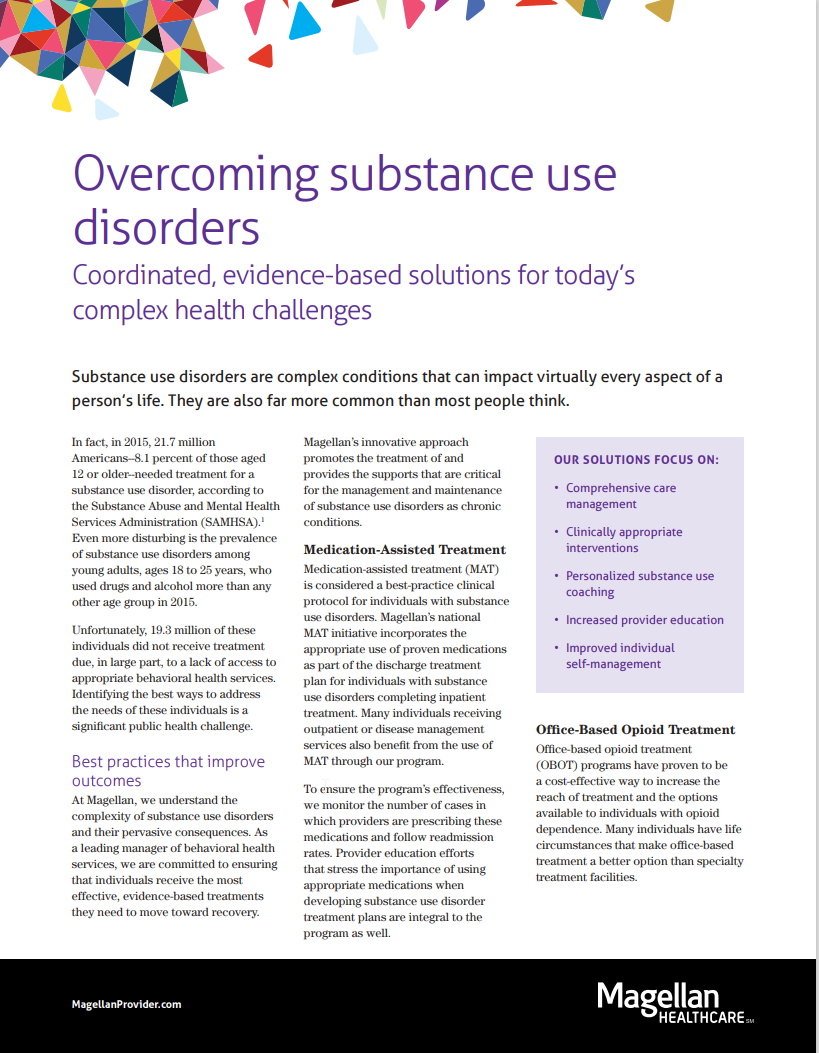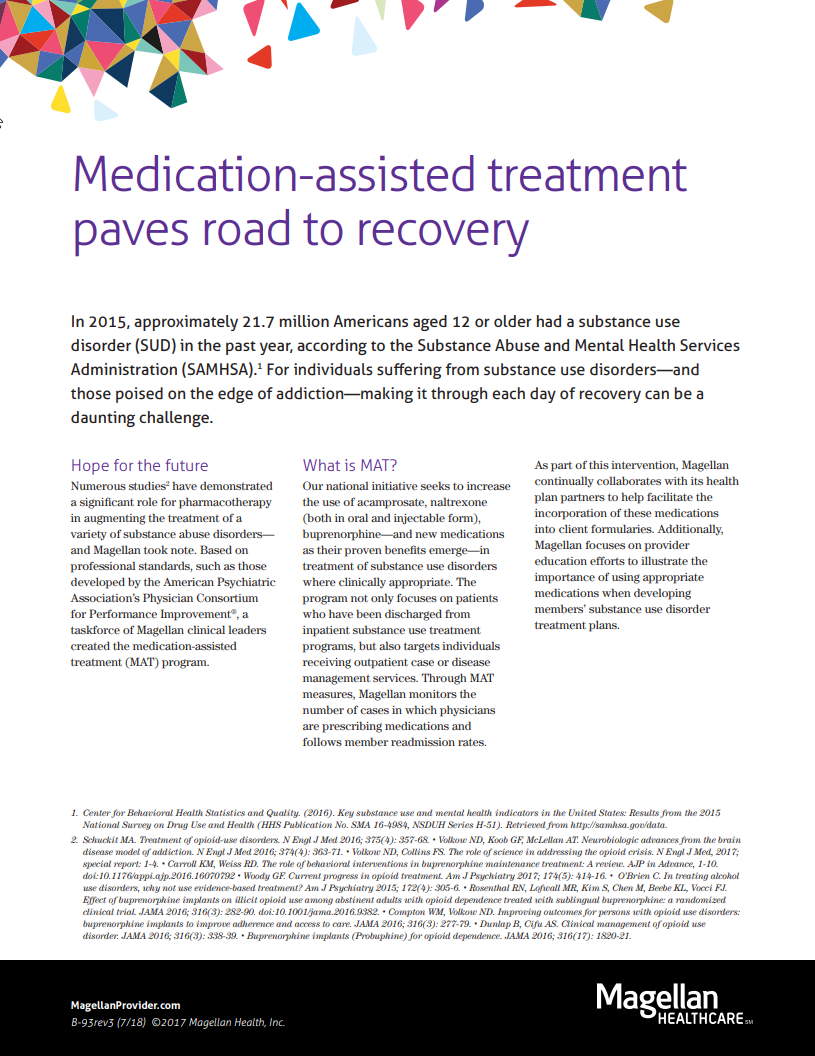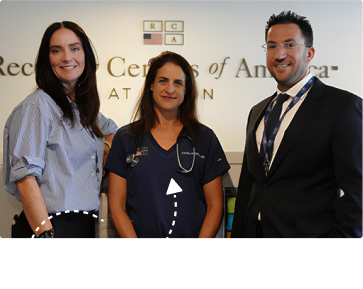Substance Use Treatment - Provider Portal
What’s on this page
Substance Use Treatment
Magellan Health catagorizes substance abuse as a chronic condition. Learn about our evidenced based approach and find resources to help you treat members.
What’s on this page
Our Approach
Our approach includes:
Medication-assisted treatment with the most-effective pharmacological remedies available
Care management
Clinical interventions
Personalized substance use coaching
Provider education
Improved member self-management.


Prescription opioid use for non-cancer pain management has significantly fueled the increase in opioid use disorders.*
Along with traditional medications and surgeries, numerous non-traditional pain management methods can help reduce an individual’s chronic pain effectively. We’ve compiled these suggestions (PDF) to help you consider and evaluate whether they could benefit your patients.
*New England Journal of Medicine. Opioid abuse in chronic pain—misconceptions and mitigation strategies. Available at http://www.nejm.org/doi/full/10.1056/NEJMra1507771
Our national MAT initiative seeks to increase the use of acamprosate, naltrexone (both in oral and injectable form), buprenorphine and new medications as their proven benefits emerge — in combination with proven psychosocial interventions — in the treatment of substance use disorders where clinically appropriate.
How does Magellan’s program work?
Focuses on patients who have been discharged from inpatient substance use treatment programs
Targets individuals receiving outpatient case or disease management services
Monitors the number of cases in which physicians are prescribing medications and follows member readmission rates
Involves continual collaboration with Magellan’s health plan partners to help facilitate the incorporation of these medications into client formularies
Advocates provider education on the importance of using appropriate medications when developing members’ substance use disorder treatment plans.
_______________________________________
Substance Use Tip Sheet (PDF)
The CDC estimates that 115 people die every day from an opioid overdose (46 of those involving prescription opioids) in the surging crisis that led the HHS in October 2017* to declare the opioid epidemic “a public health emergency.”
Opioid Treatment Programs
Learn all about covered services and how you as a Magellan provider can participate.
Magellan Billing Instructions for Opioid Use Disorder Treatment Services (PDF)
Office-Based Opioid Treatment (OBOT)
With an emphasis on medication assistance and coordinating integrated outpatient care services in treatment of patients with opioid dependence, OBOT programs have proven to be effective, confidential, accessible and safe. They have resulted in overall reduced substance use in patients as well as in overall retention in treatment, recovery, and integration in the mainstream. The use of buprenorphine in treating opioid dependence (especially with a medication-assisted model) is supported by medical literature, such as the evidenced-based retention percentages documented by the 2003 Kakko study as well as others at Yale, Hopkins and NIDA.
Contracting with Magellan to provide OBOT
For questions related to OBOT contracting and credentialing, contact your Magellan network representative today, or dial the Provider Services Line at 1-800-788-4005 and ask to be connected to your area network rep. You can also email ProviderServices@MagellanHealth.com about joining the OBOT network, and a network representative will follow up with you soon.
More information
*HHS acting secretary declares public health emergency to address national opioid crisis. Available at https://www.hhs.gov/about/news/2017/10/26/hhs-acting-secretary-declares-public-health-emergency-address-national-opioid-crisis.html
Magellan's ambulatory detoxification program encourages outpatient detoxification and continued drug treatment following detoxification to help individuals achieve long-term abstinence.
Our ambulatory detoxification protocols are used in outpatient care, 23-hour bed, partial hospital care and intensive outpatient care settings.
To learn more, check out our program description (PDF).
______________________________________________
According to SAMHSA’s 2014 National Survey on Drug Use and Health, more than one in three adults with a substance use disorder also had a mental disorder.
As a provider, do you prioritize treatment integration that addresses both mental health and substance abuse conditions? Do you consider both conditions as primary throughout treatment service planning? Magellan's program encourages providers to do just that.
Our clinical screening and assessment tools help you identify and account for patients suffering from CODs. We've also developed descriptive COD communications for providers.
___________________________
Integrated Systems of Care Needed to Address Co-Occurring Disorders (PDF)
Magellan offers support to health plans in collaborating with primary care physicians to implement Screening, Brief Intervention, and Referral to Treatment (SBIRT). SBIRT is a comprehensive, integrated approach to early intervention and treatment services for people with substance use disorders, as well as those at risk of developing these disorders.
The National Council on Behavioral Health has published an interactive resource on Improving Adolescent Health: Facilitating Change for Excellence in SBIRT.
One of the best things we can do for members who have been diagnosed with a substance use disorder is to ensure they get connected with follow-up care within 14 days of diagnosis and have two additional visits in the next 34 days to ensure continuity of care. Educating members on the importance of treatment for their condition and assisting the member in making follow-up appointments with a treating provider can go a long way toward improving outcomes.
According to the National Institute on Drug Abuse, “most people who get into and remain in treatment stop using drugs, decrease their criminal activity, and improve their occupational, social, and psychological functioning.”[i] Additionally, substance use disorder treatment (including medication-assisted treatment) has shown to reduce mortality and AOD-related morbidity rates.[ii] [iii]
Facilities and outpatient providers play a vital role in helping members receive timely initiation and engagement of alcohol and other drug (AOD) abuse or dependence treatment (IET).
- Facilities: Including these elements in your planning (PDF) can help ensure members receive the services they need (includes coding guide)
- Outpatient provider: Helping patients receive timely ambulatory follow-up with these tips (PDF) can result in more successful outcomes (includes coding guide)
- Initiation and engagement of alcohol and other drug abuse or dependence treatment (IET): slide deck (PDF)
_______________________________________________________
[ii] https://www.samhsa.gov/medication-assisted-treatment
[iii] National Institute on Drug Abuse (NIDA). (2018). How effective is drug addiction treatment? https://www.drugabuse.gov/publications/principles-drug-addiction-treatment-research-based-guide-third-edition/frequently-asked-questions/how-effective-drug-addiction-treatment
We’ve designed our PCP toolkit to support improved coordination of care between primary care and behavioral health providers. Here you’ll find:
Descriptions of common behavioral health concerns (including substance use disorders)
User-friendly screening tools
Patient handouts
Provider tip sheets and informational materials
______________________________________________________
Quick Links
This free, nationwide service was designed to help primary care providers seeking to identify and advise substance-abusing patients.
Learn more about safe and effective treatment for chronic pain.
Review resources on incorporating MAT screening and follow-up into regular patient care.
Take the waiver training to become a MAT prescriber.
______________________________________________________
Quick Links
Send completed forms to the member's plan-specific fax number or email address shown below.
ABA Treatment Plan/Concurrent Review
Texas-specific ABA Treatment Plan/Concurrent Review (commercial plans)
Checklist for completing the ABA Treatment Plan/Concurrent Review
Plan-specific fax numbers/email addresses for ABA support teams
Health Plans
Advocate Physicians Partners (APP) |
1-888-656-5409 |
AmeriHealth NJ |
1-888-656-4925 |
Blue Cross and Blue Shield of Texas (BCBSTX) |
1-888-656-4959 |
Blue Cross and Blue Shield of Texas (BCBSTX) Medicaid |
1-888-656-0266 |
Blue Shield of California (BSC) |
BSCABARequest@MagellanHealth.com When sending records via email, ensure your message is encrypted. |
Dell Children's Health Plan |
1-888-656-0266 |
Health Plan of San Mateo (HPSM) |
1-888-656-3847 |
Independence Blue Cross (IBC) |
1-888-656-4925 |
Presbyterian Health Plan (PHP) Centennial Care |
1-505-843-3019 |
Presbyterian Health Plan (PHP) Commercial |
1-888-656-4942 |
Superior Texas Medicaid |
1-888-656-0368 |
US Family Health Plan - St Vincent’s (Tricare) |
1-888-656-4219 |
Employer Plans
Lowe’s |
1-888-656-4219 |
Michelin North America |
1-888-656-4219 |
State of Illinois |
1-888-656-4219 |
Yale Health Plan |
1-888-656-4219 |
HonorHealth |
1-888-656-4219 |
Family Medical Care Plan |
1-888-656-4219 |
Clinical Practice Guidelines
- The American Society of Addiction Medicine (ASAM) Clinical Practice Guideline on Alcohol Withdrawal Management (2020)
- The ASAM National Practice Guideline for the Treatment of Opioid Use Disorder 2020: Focused Update
- The American Psychiatric Association (APA) Practice Guideline for the Pharmacological Treatment of Patients with Alcohol Use Disorder (2018) (PDF)
- Department of Veterans Affairs / Department of Defense Clinical Practice Guideline for the Management of Substance Use Disorders (2021) (PDF)
- Substance Abuse and Mental Health Services Administration Medications for Opioid Use Disorder, Treatment Improvement Protocol (TIP) Series 63 (2020)
- Magellan Tip Sheet -- Substance Use Disorders Identification (PDF)
You’re there for your patients. We're here for you.
Audit Tools

Lorem Ipsom
Joining our Network
- Professional Provider Selection Criteria
- Credentialing Process
- Network Provider Agreement Exhibits
- EAP Department of Transportation Substance Use Professionals
- Military & Family Life Counseling Program
- Veterans Disability
Support for Primary Care Physicians

PCP Toolkit
We’ve designed our PCP toolkit to support improved coordination of care between primary care and behavioral health providers. Here you’ll find:





Provider's Clinical Support System
The PCSS (Provider's Clinical Support System) is a free, nationwide service was designed to help primary care providers seeking to identify and advise substance-abusing patients.
Chronic Pain Management
Prescription opioid use for non-cancer pain management has significantly fueled the increase in opioid use disorders.
Along with traditional medications and surgeries, numerous non-traditional pain management methods can help reduce an individual’s chronic pain effectively. We’ve compiled these suggestions (PDF) to help you consider and evaluate whether they could benefit your patients.
New England Journal of Medicine
Opioid abuse in chronic pain — misconceptions and mitigation strategies
Medication-Assisted Treatment
Focuses on patients who have been discharged from inpatient substance use treatment programs
Targets individuals receiving outpatient case or disease management services
Monitors the number of cases in which physicians are prescribing medications and follows member readmission rates
Involves continual collaboration with Magellan’s health plan partners to help facilitate the incorporation of these medications into client formularies
Advocates provider education on the importance of using appropriate medications when developing members’ substance use disorder treatment plans.
Opioid Resources
Learn all about covered services and how you as a Magellan provider can participate.
Magellan Billing Instructions for Opioid Use Disorder Treatment Services (PDF)
With an emphasis on medication assistance and coordinating integrated outpatient care services in treatment of patients with opioid dependence, OBOT programs have proven to be effective, confidential, accessible and safe. They have resulted in overall reduced substance use in patients as well as in overall retention in treatment, recovery, and integration in the mainstream. The use of buprenorphine in treating opioid dependence (especially with a medication-assisted model) is supported by medical literature, such as the evidenced-based retention percentages documented by the 2003 Kakko study as well as others at Yale, Hopkins and NIDA.
For questions related to OBOT contracting and credentialing, contact your Magellan network representative today, or dial the Provider Services Line at 1-800-788-4005 and ask to be connected to your area network rep. You can also email ProviderServices@MagellanHealth.com about joining the OBOT network, and a network representative will follow up with you soon.
More information
*HHS acting secretary declares public health emergency to address national opioid crisis. Available at https://www.hhs.gov/about/news/2017/10/26/hhs-acting-secretary-declares-public-health-emergency-address-national-opioid-crisis.html
Ambulatory Detoxification
Magellan's ambulatory detoxification program encourages outpatient detoxification and continued drug treatment following detoxification to help individuals achieve long-term abstinence.
Our ambulatory detoxification protocols are used in outpatient care, 23-hour bed, partial hospital care and intensive outpatient care settings.
To learn more, check out our program description (PDF).
Co-Occuring Disorders
According to SAMHSA’s 2014 National Survey on Drug Use and Health, more than one in three adults with a substance use disorder also had a mental disorder.
As a provider, do you prioritize treatment integration that addresses both mental health and substance abuse conditions? Do you consider both conditions as primary throughout treatment service planning? Magellan's program encourages providers to do just that.
Our clinical screening and assessment tools help you identify and account for patients suffering from CODs. We've also developed descriptive COD communications for providers.
Screening, Brief Intervention, and Referral to Treatment (SBIRT)
Magellan offers support to health plans in collaborating with primary care physicians to implement Screening, Brief Intervention, and Referral to Treatment (SBIRT).
SBIRT is a comprehensive, integrated approach to early intervention and treatment services for people with substance use disorders, as well as those at risk of developing these disorders.
The National Council on Behavioral Health has published an interactive resource on Improving Adolescent Health: Facilitating Change for Excellence in SBIRT.
Initiation and Engagement of Alcohol and Other Drug (AOD) Abuse or Dependence Treatment (IET)
One of the best things we can do for members who have been diagnosed with a substance use disorder is to ensure they get connected with follow-up care within 14 days of diagnosis and have two additional visits in the next 34 days to ensure continuity of care. Educating members on the importance of treatment for their condition and assisting the member in making follow-up appointments with a treating provider can go a long way toward improving outcomes.
According to the National Institute on Drug Abuse, “most people who get into and remain in treatment stop using drugs, decrease their criminal activity, and improve their occupational, social, and psychological functioning.”[i] Additionally, substance use disorder treatment (including medication-assisted treatment) has shown to reduce mortality and AOD-related morbidity rates.[ii] [iii]
Facilities and outpatient providers play a vital role in helping members receive timely initiation and engagement of alcohol and other drug (AOD) abuse or dependence treatment (IET).
Facilities: Including these elements in your planning (PDF) can help ensure members receive the services they need (includes coding guide)
Outpatient provider: Helping patients receive timely ambulatory follow-up with these tips (PDF) can result in more successful outcomes (includes coding guide)
Initiation and engagement of alcohol and other drug abuse or dependence treatment (IET): slide deck (PDF)
National Institute on Drug Abuse (NIDA). (2018). How effective is drug addiction treatment? https://www.drugabuse.gov/publications/principles-drug-addiction-treatment-research-based-guide-third-edition/frequently-asked-questions/how-effective-drug-addiction-treatment